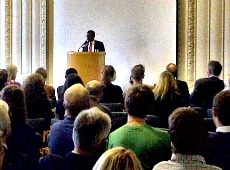Progress toward achieving gender equality has not kept pace with other development achievements in the Maldives, as reflected by the 12 percent of women who have suffered sexual abuse before the age of 15 while one in three have been the victim of violence, a Department of National Planning study has found.
The study examined how much human development progress has been achieved in the Maldives in terms of population and development, reproductive health and rights, gender equity, equality and empowerment of women as well as education during the period 1994 – 2012.
The “Maldives Operational Review for the ICPD Beyond 2014” study was conducted under the supervision of the Department of National Planning (DNP), in collaboration with the United Nations Population Fund (UNFPA), to determine whether the Maldives has met the 1994 Cairo International Conference on Population and Development (ICPD) thematic Programme of Action (PoA) goals.
The study found that “Despite impressive advancements in all development areas, the progress towards achieving gender equality and equity and the empowerment of women have not been the same.”
“Even though, the Maldivian Constitution guarantees equal rights and freedom for all Maldivians without any discrimination, prevailing traditions and socio-cultural norms have limited women’s participation in the workforce and in the community,” the study determined.
“The increasing level of religious fundamentalism and conservative thinking has worsened the situation,” it added.
Although the Domestic Violence Act 3/2012 was “a historical milestone for women in the country,” domestic violence and violence against women remains a “major concern” in the Maldives.
“One out of three females aged between 15-49 years has experienced some form of violence within their lifetime. Further, 12 percent of women reported having experienced sexual abuse before their 15th birthday,” the report stated. “Most of the time, the perpetrators are a close family member or intimate partner and the incidence goes unreported and undocumented.”
Victims to not receive appropriate and timely support, since domestic and sexual violence are perceived as a private matter and often go unreported, the study found.
Additionally, “Women continue to be stereotyped and underrepresented at professional decision making levels,” noted the report.
The low level of women being represented in senior level positions is partly due to the “high domestic burden on females,” with women heading 47 percent of households in the Maldives, one of the highest rates in the world, the study determined.
Although women are represented in the workforce, they are “mostly represented in stereotypical roles” such as education (72 percent), health (68 percent), manufacturing (65 percent) and agriculture (64 percent), said the report.
Meanwhile, 40 percent of young women remain unemployed, with 10.5 of the overall youth population being neither employed nor seeking to further their studies, the report added. Employment opportunities for many have been obstructed primarily due to inadequate employment opportunities as well as the mismatch between skills and job requirements.
The report also found that the number of women continuing their studies beyond secondary education is low compared to men. This disparity is the result of “limited access to educational institutions at the island level, domestic responsibilities and hesitance to allow females to study on another island.”
 “Special affirmative actions are needed to create more employment and livelihood opportunities for women and to increase the number of women in public and political life,” stated the report.
“Special affirmative actions are needed to create more employment and livelihood opportunities for women and to increase the number of women in public and political life,” stated the report.
Despite the Maldives achieving the Millennium Development Goal target to eradicate extreme poverty and hunger, malnutrition and anemia are still limiting women’s equality, equity and empowerment, noted the study.
“Poor nutritional status and anemia are significantly high among pregnant women and women of reproductive age, [which] puts them in high risk for maternal mortality,” the report found. “Malnutrition among women puts them in high risk during pregnancy and hinders their full participation in education, employment and social activities.”
Women – and young women’s – health is also at risk due to the lack of access to quality services, particularly in regard to sexual and reproductive health.
“With regard to reproductive rights, men often control decisions regarding women’s reproductive health, often based on religious and cultural grounds,” the report noted.
“[Furthermore,] the sudden growth of religious fundamentalism and conservative thinking is an emerging challenge, particularly for women and young girls,” the study stated. “There have been increase towards certain trends such as preference for home schooling and refusing vaccination and other medical services for women based on religious beliefs.”
Violence against women
Despite the extensive provisions in the Domestic Violence act, it has done little to curb the abuse of women, minors and other vulnerable people; the police, the judiciary and wider Maldivian society have made minimal progress addressing domestic violence and abuse, former Gender Minister and Chairperson the Hope for Women NGO, Aneesa Ahmed, recently told Minivan News.
Meanwhile, support for women’s equality has experienced a “significant drop” despite overall progress in improving the human rights situation nationally, a Human Rights Commission of the Maldives (HRCM) second baseline survey recently concluded.
“Despite the freedoms that the constitution has provided for women, attitudes towards women’s empowerment show a negative trend,” stated Andrew Cox, the former UN Resident Coordinator and UNDP representative in the Maldives.
“Alarmingly, the study also suggests that there has been a regression in people’s sensitivity towards domestic violence and gender based violence,” he added.
Male attitudes have become “more conservative” regarding women’s rights issues, whereas female views have become more supportive of rights in some areas, the report stated.
In a reversal from the 2005 human rights study, more women than men now consider it inappropriate for men to hit their wives. However, significant numbers of respondents stated where there was a “substantive justification” – as opposed to something trivial – “violence against wives was justified,” the report determined.
Both genders in the Maldives were also found to believe that in the husband/wife relationship, women should play a “subordinate role”.
In spite of this culturally conservative shift regarding women’s rights, an “overwhelming” 92 percent of Maldivians believe that laws and systems to protect women from sexual assault should be reformed, according to the results of a survey conducted by Asia Research Partners and social activism website Avaaz.org.
Maldivians believe that laws and systems to protect women from sexual assault should be reformed, according to the results of a survey conducted by Asia Research Partners and social activism website Avaaz.org.
Of those polled, 62 percent supported an outright moratorium on the practice of flogging, while 73 percent declared existing punishments for sexual crimes were unfair to women.
The international community has echoed this sentiment, particularly in regard to the recent
case in which a 15 year-old rape victim was sentenced to 100 lashes and eight months’ house arrest for a separate offence of fornication garnered substantial international attention and condemnation.
In March, an Avaaz petition calling for the repeal of the sentence and a moratorium on flogging in the Maldives collected more than two million signatures – a figure more than double the number of tourists who visit the country annually.
Currently, British couples are being asked to avoid the Maldives as a honeymoon destination to force the country’s government to overturn the conviction of the girl, who was given the draconian sentence after being raped by her stepfather, while UK Prime Minister David Cameron has been asked to intervene in the case, writes Jane Merrick for the UK’s Independent newspaper.
Maldivian Democratic Party (MDP) MP Eva Abdulla explained the current context of women’s rights in the Maldives to the publication.
“Consider the statistics on flogging: that 90 per cent of the cases are women. Consider the statistics on rape charges: 0 per cent success rate of prosecution, with the latest being the release of four men accused of raping a 16-year-old, on the grounds that there wasn’t enough evidence,” said Abdulla.
“The increasing religious fundamentalism followed by the attempts to subjugate women, both politically and otherwise, should be cause for alarm. This is a country of traditionally very strong women.
“However, increasingly, the Adhaalath Party, a self-claimed religious party which is in alliance with the current government, uses the religious card to scare off women. We women MPs are often threatened whenever we speak against the party,” she added.
Likes (3)Dislikes
(3)Dislikes (0)
(0)  “Special affirmative actions are needed to create more employment and livelihood opportunities for women and to increase the number of women in public and political life,” stated the report.
“Special affirmative actions are needed to create more employment and livelihood opportunities for women and to increase the number of women in public and political life,” stated the report. Maldivians believe that
Maldivians believe that 
